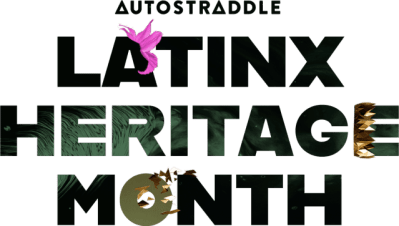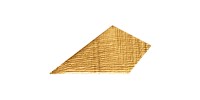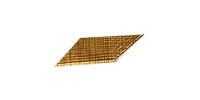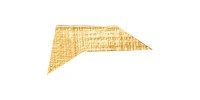
Welcome to Autostraddle’s Latinx Heritage Month essay series exploring the theme of death and rebirth.
The start of the pandemic coincided with the death of my late maternal grandmother, Minerva, in the Dominican Republic. She died the night before my green card interview, an interview I had been awaiting for 18 years, hoping and praying that she would hold on long enough to see me in the flesh. My grandmother, as her own children described her, was marvelous; she fed countless children in Barahona, Dominican Republic, helped raise grandchildren and great grand-children all while surviving two brutal dictatorships, the Parsley Massacre, the death of four children. Her connection to her familial roots, was reminiscent to that of Úrsula’s in Gabriel Garcia Marquez’s 100 Years of Solitude.
We were always close, despite having never met and she also spoke sweet prayers to me over the phone. We had spent the two years leading up to her death retracing her familial past and history. We’d spend hours on the phone, laughing, joking and it soon became a way for my mother to learn more about her mother and ancestors as well. I learned about family members who were imprisoned under the Trujillo regime for being communists and others who were the founders of towns in present day DR. Together, we weaved our ancestral story, the threads connecting us to ancestors and descendants in our lineage, a web so fragile it threatened to cave in every time we tried to remember.
At the same time that I was grieving the death of our family’s matriarch in an immigration waiting room, the astrological makeup of 2020 was reminiscent of catastrophic events that hadn’t happened for over 80 years.

Three days after losing my grandmother, on January 12, 2020, Saturn, the planet of restrictions, karma and limitations perfected his conjunction with Pluto, the planet of intensity, death, and rebirth in the sign of Capricorn at 22°. The Saturn-Pluto conjunction is credited by many astrologers as being the astrological reason behind the COVID-19 pandemic. As the cosmos would have it, this event, which astrologers everywhere were deeming uncomfortably transformative and traumatic, fell directly and very intimately in my natal birth chart. A natal birth chart is an extremely sacred and sensitive piece of information which maps out things like your life’s journey or duty in this life, your karmic debts, your potential health problems and your relationship with figures like your mother, father and siblings. For me, it has become a tool through which I can analyze my ancestral connections, foretell catastrophic events like the Saturn-Pluto conjunction and learn how to navigate through death, rebirth, cycles and karma.
The 22° in astrology has been coined as the “kill or be killed” degree. As a Capricorn degree, the 22° represents extreme, critical, make or break moments and can sometimes refer to death. This degree intensifies themes of death, karma and deep structural change. For me, this astrological climate deeply impacted areas of my life related to ancestry, family, early childhood, my mother and foundations of all kind.

My grandmother’s death completely pulled the rug out from under me. She was in many ways, more than a grandmother, and despite us not having met in person, our frequent phone conversations allowed us to foster an intimate, sister-like bond.
She died during a Full Moon Lunar Eclipse in Cancer, the watery sign representing our mothers, the maternal, and my natal moon sign. Eclipses activate the lunar nodes which represent our karmic duties in this life. Being in the same sign as my natal moon, the eclipse illuminated some aspect of my karmic path and destiny and being that the moon represents the maternal, the eclipse triggered the death (karmic) of my grandmother (the moon, the maternal). This wasn’t the first time I would lose a loved one, during a pivotal moment in my life. My maternal grandfather died on the morning of my middle school graduation, just hours before I was set to deliver a speech, shrouding a happy, celebratory moment in death. My mother sat through my 8th grade graduation in tears, similarly to her sitting through our green card interview in tears. Both times, during critical (22°) moments in my life, my mother had to choose between staying to support her daughter or attending a parent’s funeral.
As grandchildren, we can’t fathom ever losing grandparents but for grandparents, being around for us often means watching everyone they love die. And even still, my grandmother would sweetly, nostalgically recount stories of her family and youth for me, despite having been without them for so many years. Realizing that made me feel incredibly selfish for wanting my grandmother to hold on to life a little longer. Here I was pleading with her on her death bed while all these years, she’s witnessed so much loss and experienced loneliness. I guess that’s why a week after my grandmother passed, her last surviving sister passed as well.
For months, after my grandmother’s death I learned about astrological transits, my own birth chart, planets in our solar system, karmic cycles, fixed stars. What I’ve learned is that having the ability to analyze and forecast tragedy, death, and catastrophe in life rarely softens or even prevents it. Yes, the astrological makeup of 2020 was kind of rigged against me but once you know something like that, there’s nothing much to do but just.. live through it. So I did.
Two months after my grandmother’s death I left the country for home, Curacao, where I discovered a plethora of distant relatives, colonial dissent, sweet feelings of home, and a matriarch whose first words to me were: “I thought I would die before I saw you again.” I’ve dabbled in genealogical astrology, mapping the planets and stars that I inherited from my ancestors. I found out my grandmother and I shared three personal placements which according to genealogical astrology, we can inherit traits in our natal birth chart from our ancestors.

In Ifa, a Yoruba-based religion, we believe that when we die, we are reincarnated into our same family lineage. I’ve imagined all the ways in which it would be possible that my grandmother was once my sister, or my aunt, a friend in a past life or even a version of me. We depended on each other in so many ways. We still do, even after her death. The Pattern, an astrology app, says of my grandmother and I’s friendship synastry: “You and Minerva have one of the most positive and progressive connections that two friends can have. It’s like you brighten each other’s day and boost each other’s confidence. You’re expanding her life purpose and helping her reach her destiny — and Minerva does the same thing for you.” Her death left a void in my life that won’t be filled or replaced.
Following in her footsteps, I began to learn herbal medicine and about healing herbs used in my ancestral lineage. Specifically, I’m learning about the importance of plant allies, how their medicinal properties cure a variety of ailments in life. For instance, la mala madre is good for pain from menstrual cramps while epazote is good for treating stomach ailments. I’m educating myself on local medicinal plants in my area while also learning more about ways to tend to and repair a relationship to the stolen land I live on. Learning herbal medicine is important for me as a descendant of maroons, of people in intimate relationships with the land who also relied on plant allies for existence, survival, and healing. My mother tells me stories of my grandmother who treated almost all her illnesses by boiling medicinal leaves she’d pluck off local guanabana and higuereta trees and by drinking a teaspoon of coconut oil everyday. But as her health deteriorated, it became harder for her to gain access to the medicinal herbs she once relied on, leaving her to rely on local hospitals and clinics.The medical system continuously failed my grandmother who lived in chronic pain up until her last breath. It failed her daughter, my mother, and it continues to disproportionately fail and harm Black women.

Although there isn’t an abundance of epazote or oregano poleo growing in the concrete streets of New York, I am dedicated to continuing my grandmother’s legacy by relying on plant allies to further heal when and where I can. It is not only my birth right to reclaim holistic and herbal medicine in my family but it is also needed for my survival. I realize that life is temporary, is fleeting, is vulnerable and needs to be guarded and cherished. In Ifa and other African Traditional/Diasporic Religions, when you heal yourself, you heal your entire lineage. And healing doesn’t stop once death happens but it remains an omnipresent process that every generation is responsible for furthering. That is why I drink ginger tea during flu season, why I drink bitters for stomach pain, why I smell rosemary to help with ADHD, why I drink spoonfuls of coconut oil in Minerva’s name. Because I know someone loves and cherishes my own life the way I cherished my grandmother’s and that person is me.



I’m so very sorry for your loss. May her memory be a blessing, and may she rest in peace and power with her ancestors.